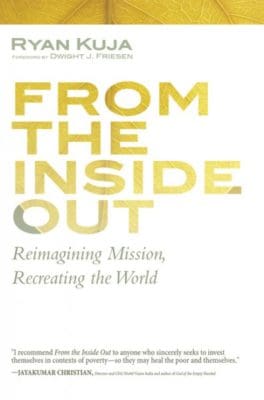The evolution that has taken place in the world of mission over the last twenty-five years has left many Christians asking brutally honest questions about what we do and why we do it. Are we doing more damage than good? What does it look like to truly love and serve the marginalized in an authentic and effective way? What, actually, is the gospel and is it truly good news? In this groundbreaking book, Ryan Kuja vividly examines the world of Christian mission as few have seen it. With a beautiful balance of storytelling and theological reflection birthed from his own painful and powerful experiences on and off the field–from rural villages in South Sudan to major cities across Asia, Africa, and Latin America–Ryan guides us into global mission’s past and present, revealing where the light and hope lie, helping recover a missional future that will usher us into a new era. This is mission reimagined for a world recreated…from the inside out.
We’re proud to say that Ryan is a member of our Word Made Flesh Community. Please enjoy this excerpt from chapter 7 of his new book.
 Excerpt from chapter 7 — Aliens, Athens, and Incarnation
Excerpt from chapter 7 — Aliens, Athens, and Incarnation
Signs of War and Peace on the River Nile
Engaging with culture can be tricky, especially since culture exists out there in the world and also in here as a lens through which we see. Because of the power that the dominant culture holds, members of this population often view their own group as being culturally neutral.
Encountering the gospel in unfamiliar forms while serving overseas is a challenge as it involves our cultural lens (in here) and the unfamiliar cultural expression (out there) interacting with one another. If we don’t know what to do with that, there can be many less than ideal outcomes.
I’ve learned this lesson the hard way more times than I care to admit.
One particular example occurred when I was living in South Sudan. Deng was a local Sudanese staff member working in the realm of community health at the same NGO as me. We were asked to implement plans for a new therapeutic feeding center for children afflicted by severe acute malnutrition in a village a short flight away by bush plane. One day, Deng and I were walking to the work site along a path cut into the forest immediately above the waters of the White Nile. As we walked, he began to tell me of the biblical significance of the river and of South Sudan.
“Do you know this river from Isaiah chapter 18?” asked Deng, with the tone of an intellectual.
“No. I don’t. Tell me more,” I replied.
“Isaiah 18 speaks of this place where we walk. Do you see that river? In 1982, things began floating in it, carried by the current. When we saw them, we knew a great conflict was coming. In 1983, the war began. The north started attacking us. They started killing us, bombing us, terrorizing us.”
“So what did you see floating in the river?” I asked him, part curious to hear more and part incredulous that he was connecting a passage from the Hebrew scriptures directly to a modern-day armed conflict.
“It is all right here. Let me show you,” Deng said as he stopped walking and proceeded to sit down.
He opened the backpack he was carrying, pulled out his Bible, and began to read from the eighteenth chapter of Isaiah: “Woe to the land of whirring wings along the rivers of Cush, which sends envoys by sea in papyrus boats over the water. Go, swift messengers, to a people tall and smooth-skinned, to a people feared far and wide, an aggressive nation of strange speech, whose land is divided by rivers.”
“The papyrus boats,” he explained, “were here, flowing up the White Nile toward Egypt. They’re not actual papyrus or boats at all, but plants. Certain plants, thousands of them flowed north on the river. We knew that meant a war was coming. The plants could be seen every day for many years. Now that the war is over, again they have stopped. There is peace now.”
The plants stopped flowing. The war is over. There is peace now.
The symbols of both bloodshed and the return of peace were seen in the river. For Deng, the words of Isaiah were evidenced in the waters of the White Nile. His experience as a Christian was largely tied to liberation from war and the oppression perpetrated by the government of Sudan who had persecuted his people for decades.
At the time Deng and I walked along the banks of the river together, I did not have a robust understanding of the local context and how that informed how Deng and many other South Sudanese read this passage from Isaiah. They interpreted the passage in a manner that allowed it to come alive for them. They let the sacred text speak into their lived experience of both suffering and liberation.

A global citizen with a background in international mission, relief, and development, Ryan Kuja has lived in fifteen cities and rural villages on five continents. He holds an M.A. in Theology and Culture from The Seattle School of Theology and Psychology as well a Diploma in Humanitarian Assistance from Liverpool School of Tropical Medicine. A spiritual director and writer, he has written for Sojourners, Missio Alliance and several theological journals. His first book, From the Inside Out: Reimagining Mission, Recreating the World, released in June 2018. Ryan is currently serving as the Field Director of Word Made Flesh in Medellin, Colombia. You can find him online at ryankuja.com and on twitter as @ryankuja.
